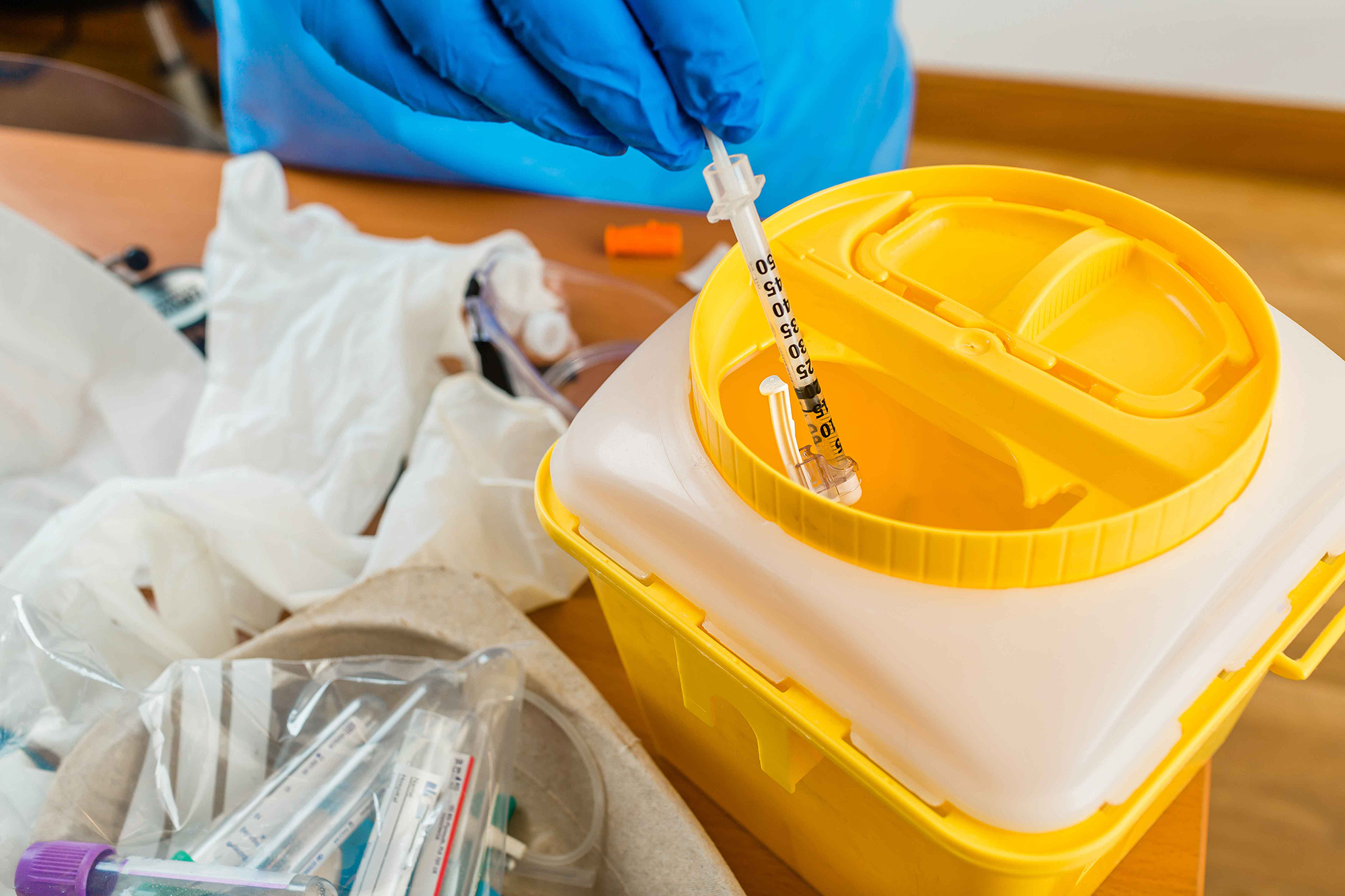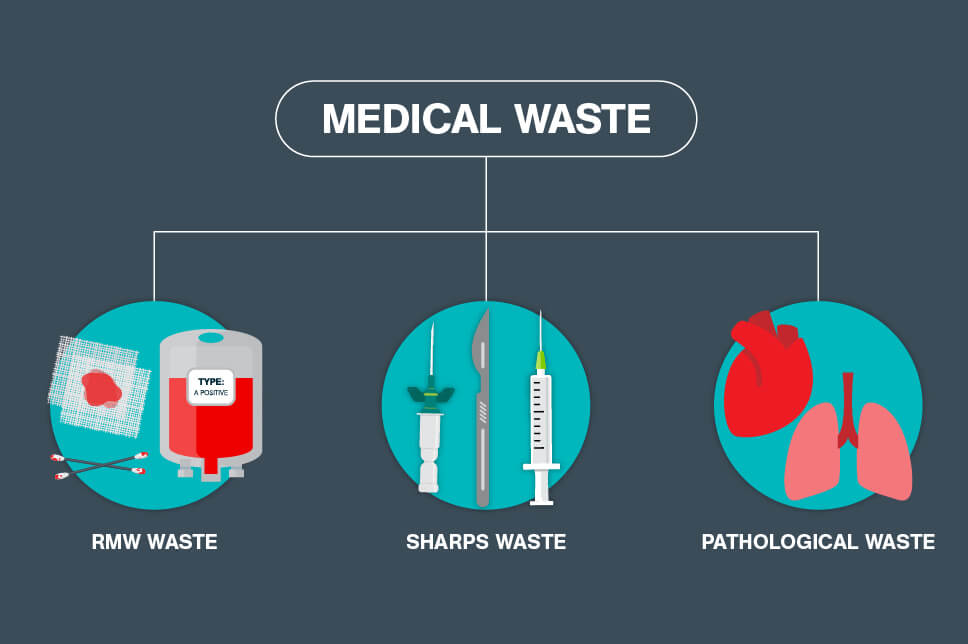Your Ally in Medical Waste Removal: Expert Service with Environmental Treatment
Wiki Article
Making Sure Safe Handling and Disposal of Medical Waste
Guaranteeing secure handling and disposal of medical waste is of extremely important relevance in healthcare setups. Improper management of medical waste can present considerable threats to the setting, public health and wellness, and healthcare employees. In this introduction, we will certainly explore the relevance of appropriate clinical waste management, the threats linked with incorrect handling and disposal, as well as the guidelines and methods that can be implemented to ensure its risk-free disposal.Importance of Proper Clinical Waste Monitoring
Appropriate clinical waste management is of utmost importance in making sure the safety and health of health care experts, individuals, and the general public. Clinical waste refers to any type of waste generated by health care centers during the diagnosis, treatment, or booster shot of people or pets. This waste can posture severe wellness risks if not managed and dealt with properly.
Among the primary reasons that correct medical waste administration is critical is to stop the spread of infectious diseases. Medical waste, such as used needles, polluted dressings, and organic materials, can lug damaging virus. If not dealt with and gotten rid of properly, these virus can be sent to health care workers, patients, waste trainers, and even the public, bring about the possible break out of conditions.
Furthermore, appropriate medical waste monitoring assists secure the atmosphere - medical waste disposal service. Clinical waste includes unsafe materials, including chemicals, drugs, and contaminated compounds. When not handled appropriately, these substances can infect soil, water bodies, and the air, presenting a substantial threat to ecosystems and public health and wellness
Additionally, efficient clinical waste administration makes sure conformity with local laws and global criteria. Governments and governing bodies have actually established standards and protocols to make sure the safe handling, storage, transport, and disposal of medical waste. Adhering to these regulations is necessary to avoid legal consequences and preserve the online reputation and trustworthiness of medical care facilities.
Threats of Improper Handling and Disposal

If clinical waste is not properly disposed of,Individuals can also be subjected to these transmittable illness. If polluted needles or other sharps are not disposed of in assigned puncture-proof containers, they might mistakenly prick individuals, leading to possible infections. Moreover, if clinical waste is not set apart correctly, there is a threat of cross-contamination in between various sorts of waste, more boosting the opportunities of condition transmission.
Inappropriate disposal of medical waste can additionally have harmful impacts on the atmosphere and the public. If clinical waste is not dealt with and taken care of appropriately, it can contaminate water sources, soil, and air, causing the spread of pollutants and diseases. This can have lasting repercussions on communities and public health and wellness.
Guidelines for Safe Handling of Medical Waste
Executing efficient protocols for the secure handling of medical waste is vital in making sure the security of medical care specialists, patients, and the public. These standards are crucial in reducing the dangers connected with the handling and disposal of clinical waste, such as infections, injuries, and ecological contamination.Firstly, medical care facilities should develop a comprehensive waste management plan that follows neighborhood, nationwide, and international laws. This strategy ought to consist of clear guidelines on waste partition, packaging, storage, labeling, and transport. It is crucial to separate various kinds of waste, such as sharps, contagious products, drugs, and non-hazardous waste, to avoid cross-contamination and promote safe disposal.
In addition, healthcare employees should obtain thorough training on appropriate waste handling strategies. They need to be informed on the possible hazards of clinical waste, the proper usage of personal protective equipment (PPE), and the correct treatments for managing, moving, and getting rid of various types of waste.
In addition, healthcare facilities must frequently keep track of and investigate their waste monitoring techniques to ensure compliance with guidelines. This consists of performing normal examinations, reviewing waste handling procedures, and supplying comments and training to personnel participants.
Effective Techniques for Garbage Disposal
To ensure the safe handling and disposal of clinical waste, it is vital to use reliable techniques for garbage disposal. Clinical waste can position substantial dangers to public wellness and the setting otherwise taken care of and taken care of appropriately. Healthcare centers and waste administration organizations need to execute appropriate strategies to mitigate these dangers.It includes separating different kinds of medical waste based on their qualities. Health care centers need to give clear standards and training to team participants on how to set apart waste properly.

Additionally, medical care facilities should collaborate with accredited waste administration firms to guarantee appropriate disposal of medical waste. These firms have the experience and devices required to securely manage and dispose of medical waste in conformity with policies and best practices.
Training and Education And Learning for Medical Care Professionals
Healthcare experts play an important duty in ensuring the safe handling and disposal of medical waste through extensive training and education. It is essential for doctor to have a deep understanding of the potential threats connected with clinical waste and the correct protocols for its monitoring. By receiving appropriate training, medical care specialists can decrease the prospective transmission of contagious diseases, prevent environmental contamination, and shield both themselves and the basic public.
Furthermore, training programs need to emphasize making use of individual protective devices (PPE) and correct hand health practices when taking care of medical waste. medical waste disposal. Medical care specialists should know how to properly use and dispose of PPE to shield themselves from potential direct exposure to dangerous products. They need to additionally be educated on the significance of regular handwashing and the correct use hand sanitizers to minimize the spread of contagious diseases
Continuing education and learning and routine updates on medical waste management practices are critical for health care specialists. As regulations and standards develop, it is vital to maintain health care providers notified about any type of adjustments in protocols and ideal methods. This will make sure that they stay current and maintain a high standard of safety in getting rid of and handling of clinical waste.
Conclusion
In verdict, proper handling and disposal of clinical waste is essential to guarantee the safety and security of healthcare experts, people, and the environment. Overlooking to comply with guidelines and guidelines can lead to numerous threats and threats. Applying efficient methods for waste disposal and giving proper training and education for health care specialists are necessary in maintaining a safe medical care atmosphere. By adhering to these methods, we can mitigate the potential risks connected with clinical waste.Medical waste refers to any company website waste generated by medical care facilities during the diagnosis, treatment, or booster shot of pets or people. If clinical waste is not set apart appropriately, there is a risk of cross-contamination between various kinds of waste, additional enhancing the possibilities of condition transmission.
It is crucial to divide different kinds of waste, such as sharps, infectious materials, pharmaceuticals, and non-hazardous waste, to avoid cross-contamination and promote safe disposal. WasteX Medical Waste Disposal.
To make sure the safe handling and disposal of medical waste, it is essential to use reliable techniques for waste disposal. In addition, healthcare facilities should develop a routine waste collection and transportation routine to protect against waste buildup and lessen the threat of crashes or contamination.
Report this wiki page